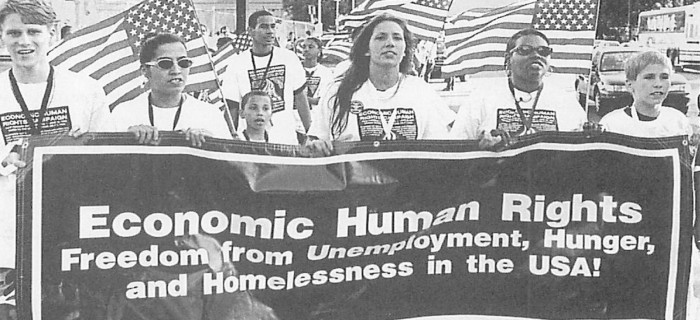Shredding the Safety Net: Welfare Reform As We Know It
Food First Backgrounder, Winter 1998, Vol. 5, No. 4
It’s time to honor and reward people who work hard and play by the rules. That means ending welfare as we know it—not by punishing the poor or preaching to them, but by empowering Americans to take care of their children and improve their lives. – Bill Clinton, 1992
Everyone has the right to a standard of living adequate for the health and wellbeing of himself (herself) and his (her) family, including food, clothing, housing and medical care and necessary social services, and the right to security in the event of unemployment, sickness, disability, widowhood, old age or other lack of livelihood in circumstances beyond his (her) control. – Article 25, Universal Declaration of Human Rights 1948
At Colonel Sanders they used to put the left-overs in the garbage bin. There used to be 10 to 15 people every night looking for food in the garbage, including myself—just looking for something to eat. I have really seen hunger, especially in the faces of children. I know it’s hard on them. It was hard on me. – Rufus Herold, former homeless senior, now on the staff at St. Mary’s Center, Oakland
Rufus Herold may not be an expert on welfare reform, but he does know about hunger. Herold could write a book on his experiences while looking for something to eat. Today he helps other seniors find their way out of dehumanizing hunger, poverty, and homelessness.
While Herold ladles our soup, our government leaders tell us that the economy is booming, with low employment, rising incomes, and shrinking welfare rolls. But more and more people are sliding through the cracks. Herold wishes that policy makers, who have never known hunger, could get a closer look at the people waiting in food lines. Then maybe they would understand, and maybe they would change things.
On August 22, 1996 in the Rose Garden of the White House, President Clinton signed into law the Orwellian sounding Personal Responsibility and Work Opportunity Reconciliation Act, better known as Welfare Reform, the most sweeping change in our welfare system in sixty years. With his signature, Clinton’s talk of “not punishing or preaching” became indistinguishable from the Republican Party’s poor-bashing Contract with America. How Mr. Clinton slid from a welfare plan that would have added about $10 billion more in spending to embracing one that would cut $54 billion is a sad tale of American politics. Furthermore, it raises the specter of systematic violations of basic human rights here in the United Stares of America, if we are judged by the international standards of the Universal Declaration of Human Rights, adopted fifty years ago by the United Nations General Assembly.
Stay in the loop with Food First!
Get our independent analysis, research, and other publications you care about to your inbox for free!
Sign up today!In this report we rally the impact of welfare reform, expose seldom reported corporate profit-taking, and conflict of interest in privatizing parts of the system, and exam in e the human rights implications of current policies. We end with a call to join our “Economic Human Rights: The Time Has Come!” campaign.


 Help Food First to continue growing an informed, transformative, and flourishing food movement.
Help Food First to continue growing an informed, transformative, and flourishing food movement.




